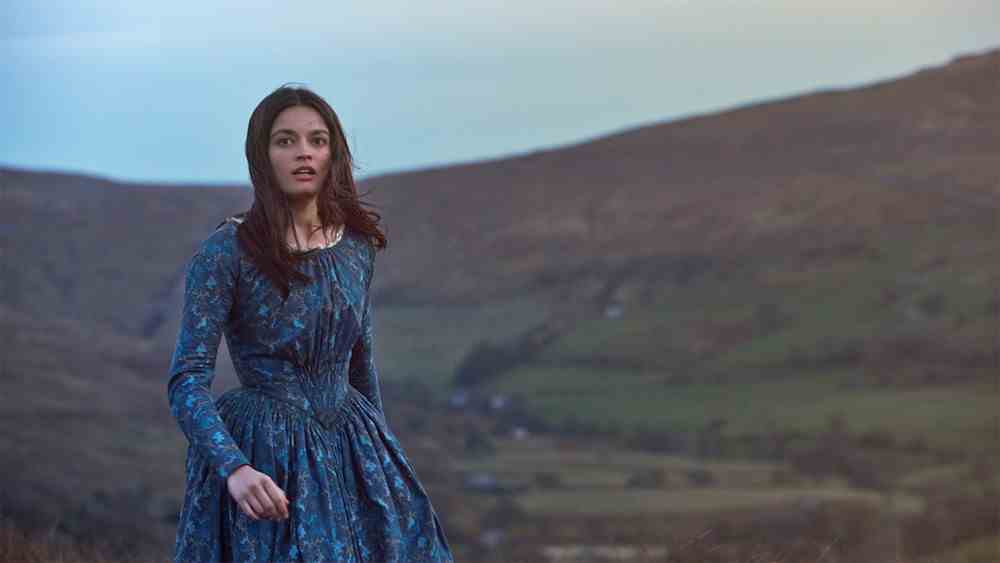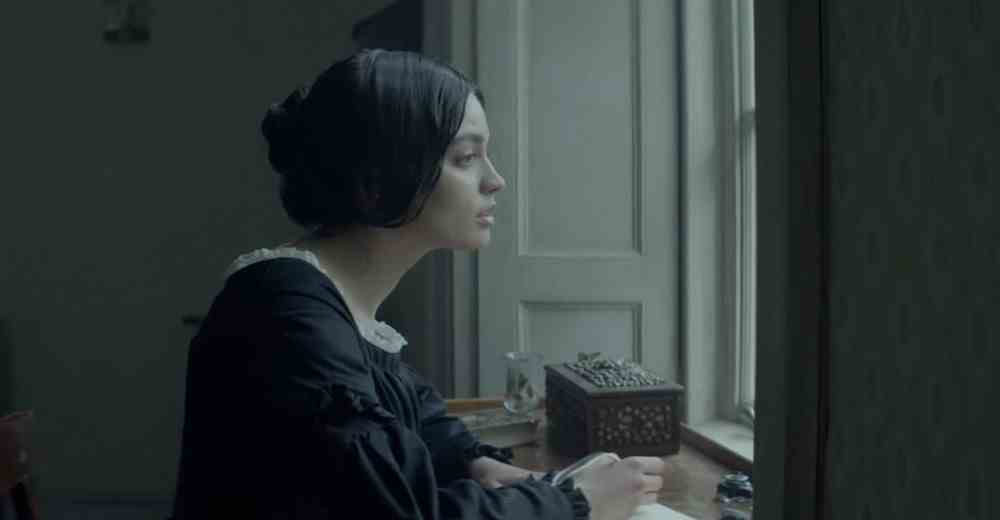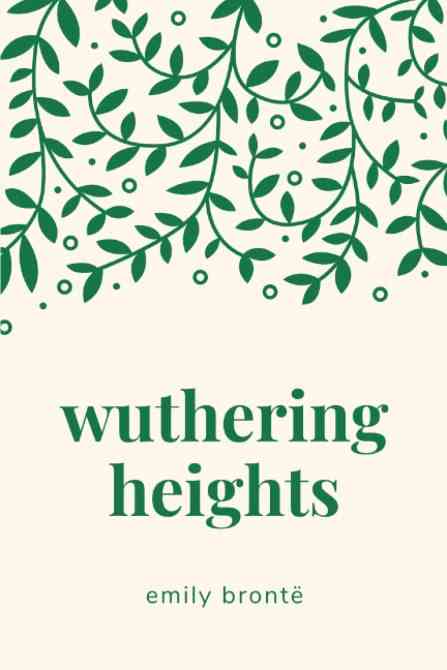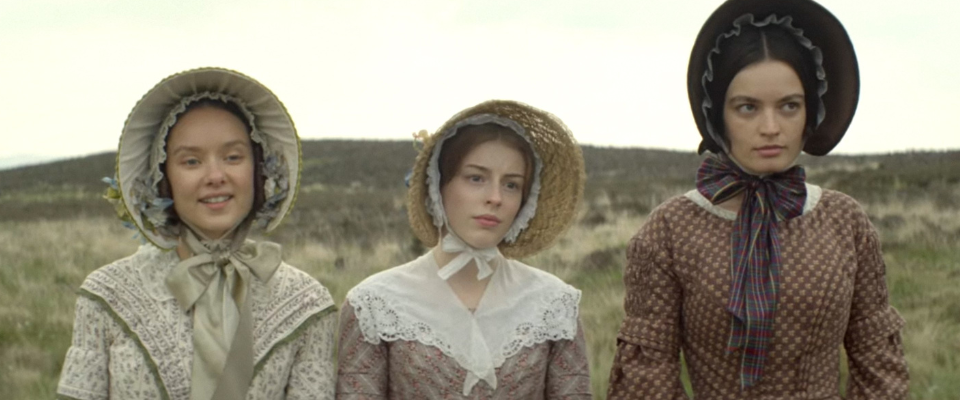British-born Australian actress and director Frances O’Connor read Emily Brontë’s gothic novel Wuthering Heights on the school bus when she was 15, vociferously immersing herself in the fictional Cathy and Heathcliff’s doomed lives.
Forty years later, that same sense of magic O’Connor unearthed in Brontë’s world as a teenager infuses her directorial debut, Emily. Though chronologically true to the 19th-century novelist’s abbreviated life (Emily died at the age of 30), it is not tethered to facts about the notoriously private author. “There’s something nice about the fact that she’s a mystery to us. You kind of think that you know her, but at the same time she’s a mystery and that’s lovely,” O’Connor tells StyleCaster.
She clarifies, “It was never a biopic. It was really an exploration of female identity and female authenticity through the lens of Emily Brontë as a character. For me, growing up, I located in Emily a sense of truth and feeling different; [I identified with] feeling like maybe your voice wasn’t being appreciated. I thought that there was a story to be told: how do you find your voice if you don’t see yourself reflected anywhere?”
Emma Mackey. Image: Bleecker Street Films / Courtesy Everett Collection
In the opening scene of Emily, we witness the protagonist—famed author Emily Brontë (Emma Mackey)—lose the color from her face and faint. Her sisters rush to lay her weakened body on the sofa as the doctor is called for. As Emily regains consciousness and tries to calm her ragged breathing, her sister Charlotte (Alexandra Dowling) fixes her with a withering glare. “How did you write it? How did you write Wuthering Heights?” Charlotte demands. “I took my pen and put it to paper,” Emily responds. Charlotte insists that there is a secret source of inspiration Emily is keeping from her, “something” that must be revealed. “It’s an ugly book,” Charlotte cries. “It’s base and ugly, full of selfish people who only care for themselves!”
Emily’s Wuthering Heights was published in December 1847, originally under the pseudonym Ellis Bell. Earlier the same year, Charlotte’s Jane Eyre was published under the pen name Currer Bell, followed by Anne’s debut novel Agnes Grey, all of which established the Brontë sisters as fearsome independent talents. More than a century since its publication, it is Emily’s single novel that has inspired pop songs, films and TV series. (Fans shouldn’t miss Kate Bush’s witchily wonderful ballad “Wuthering Heights” nor Kaya Scoledario in the 2011 movie of the same name). O’Connor knew that she had to amplify Emily’s voice, to twist a traditional tale while being true to the era and how exceptional it was for a woman to reject marriage and motherhood for a literary pursuit.
Rather than being absolutely perfect, Emily is flawed and she has issues; she’s really her own person.
“I really loved Wuthering Heights, Emily’s poetry and what she stands for: that she was so different from everyone,” O’Connor explains. “She had this unique voice singing out, and I wanted to celebrate that, the essence of who she is. When I read Wuthering Heights at 15 on the school bus, it made such an impression on me; I felt so transported into that world. I loved the characters too; these rebellious anti-heroes and there was something really wild about them that I was drawn to. I didn’t want to tell the story of ‘Emily did this, then she did that’, why tell that story? I wanted to tell a story that felt magical, kind of gothic, and guided by the sensibilities that Emily had as she was growing up.”
Though Anne and Charlotte would go on to write further novels, and literary classics to this day, Emily’s gothic fiction, featuring Heathcliff and Catherine’s doomed romance, was her only work. Her premature death at 30 in Yorkshire, England, proved one of the final tragedies suffered by the Brontë family. (The widely accepted story, though nobody knows for sure, is that Emily succumbed to tuberculosis.) Emily’s mother died of cancer when the sisters were young children, and her two older sisters, Maria and Elizabeth, died soon afterward, also of tuberculosis.
Their father, Patrick (Adrian Dunbar) and aunt Elizabeth took over the sibling’s homeschooling—providing son Branwell (Fionn Whitehead) and daughters Anne, Charlotte and Emily—with the freedom to read and imagine worlds populated by characters who were an amalgam of memory, truth, and literary inspirations.
Emily was famously private and much has been speculated by biographers and critics. Like Catherine, her headstrong and lovely creation in Wuthering Heights, Emily would not squeeze her life into a subservient, socially engaged model of God-fearing womanliness. “Do you know what they call you in the village?” Charlotte sneers at Emily. “They call you the strange one, and you are. Mother would be ashamed to see who you’ve become… I won’t let you drag me down!”

Emma Mackey. Image: Bleecker Street Films / Courtesy Everett Collection
There is a harrowing scene in which—in one of their seemingly regular games of imagination and acting—Emily dons a theatre mask and takes on the persona of her deceased mother. What begins as an innocent game quickly turns horrifying. “Who are you?” asks Charlotte, tentatively. “Don’t you know me child…?”
“Mother?” whispers Charlotte, letting her defenses drop. “Stop it, Emily!” insists Anne. “Please don’t be afraid, I’ve waited so long to see you, all my children…” There is silence as Emily’s ghostly, masked face holds her witnesses in awe. But as Emily grows increasingly frenzied and loses her breath, they wail, “Take the mask off! Take the mask off!” As haunting as the scene is, O’Connor is evidently and justifiably proud of it.
“The mask scene was based in truth. The mask was a real object that the Brontës had. It was given to their parents on their wedding eve, though they never found out who they got it from. I saw it as an object to locate Emily’s imagination and her connection to her mother; to explore those things we inherit from mother to daughter in terms of how we see our own image. We set the film up in a way that was quite traditional, but the mask scene really breaks through that and says ‘actually, we’re not watching that kind of film, we’re going somewhere different’. That was the feeling a lot of people had reading Wuthering Heights as well. It’s not a traditional Victorian novel.”
Emily was an independent soul long before it became the norm for women to live alone and immerse themselves in creative occupations. Arguably, it is still seen as strange for women to knowingly and determinedly reject being wives, mothers, nice, socially amenable and appropriate. “Is there something wrong with me, brother?” Emily asks her brother, Branwell. “Am I strange?”
Emily is reticent and protective of herself, apart from when she is literally wearing a mask or speaking in French or (self-taught) German. An ill-fated lust for her new neighbor, the Curate William Weightman, wrenches her into despair but it is Branwell who provides a much more complex and intimate partnership. Not sexual, but one of like-minded, troubled and abandoned children trying to become adults without the assurances or guidance of mothers or elder siblings. Theirs is the dependence and love that reflects their solitary natures, and the intensity of love they are capable of when they are not being watched, judged and measured by outside eyes. The relationship between Emma and Branwell is so intense—perhaps Heathcliff and Catherine-ish—and, dare I suggest, more compelling than Emily’s love interest, William Weightman.
O’Connor took liberties with the real Brontë siblings, fusing their story with an homage to Wuthering Heights’ Cathy and Heathcliff, who were raised in the same household but not by the same parents. “In this story, because we’re weaving Wuthering Heights into the story, there’s an echo of Heathcliff and Cathy: their love for each other and understanding of the darker parts of each other, and acceptance of that, which helps Emily to write and to be her authentic self. Ultimately, he’s the only one that believes in her and Cathy is the only one who believes in Heathcliff,” O’Connor explains. “There’s a closeness to them, and a fierceness of love between them that is ultimately betrayed. There’s a dark energy of everyone destroying one another, and I wanted to have that as a theme, though I don’t know if there was anything like that in the real Emily and Branwell. Especially at the end of his life, when he was an opium addict, he really relied on her and she was very loyal to him in real life, but I wanted to play with the Heathcliff-Cathy dynamic.”
Mackey is outstanding. Magical, even. Despite her famed role in Sex Education, O’Connor had not seen the series. Her casting director, the esteemed Fiona Weir (Fantastic Beasts: The Secrets of Dumbledore, The Duke, Brassic, The School for Good and Evil) had said, “You should probably meet Emma, I think she’s pretty amazing”.

Emma Mackey. Image: Bleecker Street Films / Courtesy Everett Collection
O’Connor admits, “I knew that she was in Sex Education but I hadn’t really watched the show, though my son loved it. I thought there was something intriguing about casting her in the role because she’s got this strong identity, this strong energy, but I wasn’t sure. Anyway, when she came in and read for the part, something happened in the room that was really electric. There’s something so exciting about her acting, and she’s got a great sense of humor. Emily has a lot of very funny moments and I think that’s so real and so human. Rather than being absolutely perfect, Emily is flawed and she has issues; she’s really her own person. There was something really exciting about casting Emma in that role.”
An award-winning actress, O’Connor debuted in the 1996 Australian romantic comedy Love And Other Catastrophes (also starring Radha Mitchell), followed the next year by Kiss Or Kill and Thank God He Met Lizzie (alongside Cate Blanchett and Richard Roxburgh). While she has endless respect for Bradley Cooper’s ability to both direct and act in A Star Is Born, she effusively denies that she had any desire to wear both actorly and directorial hats on the set of Emily.
“Not at all!” she insists. “It is so hard to direct. I really don’t know how people switch to go behind the camera and do good acting. It’s a completely different skill set. When I’m acting, I like to be very immersive, and I like to have the luxury of time to think between takes, to really go there, because you’re telling a story and that’s a big responsibility. I saw what Bradley Cooper did on A Star Is Born and I was just gobsmacked, it’s a brilliant performance. I couldn’t do that at this point, but maybe if I do another five films, on the fifth film, I’ll give myself a small part.”
Emily is in selected cinemas.
Wuthering Heights by Emily Brontë

Wuthering Heights. Amazon
Set in the west Yorkshire moors, Wuthering Heights is the story of two gentry families—the Earnshaws and the Lintons—and their turbulent relationships with Earnshaw’s adopted son, Heathcliff. Now considered to be a timeless classic, it was a polarizing and controversial work in its own day, with its frank depictions of mental and physical cruelty and ahead-of-its-time challenges to Victorian conventions and mores.
Buy: Buy ‘Wuthering Heights’ By Emily Bronte $8.99+

Our mission at STYLECASTER is to bring style to the people, and we only feature products we think you’ll love as much as we do. Please note that if you purchase something by clicking on a link within this story, we may receive a small commission from the sale.

